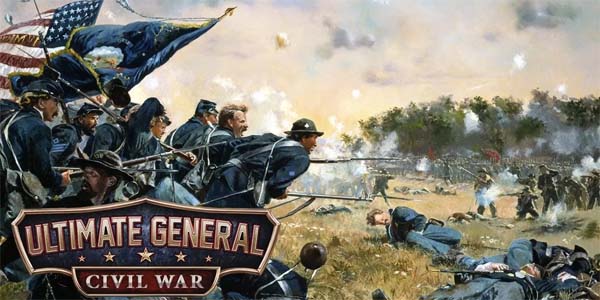

I've asked on numerous occasion for Creative Assembly to build a Total War game based on the American Civil War. I thought for sure that Total War: Shogun 2's second expansion Fall of the Samurai -- with its focus on industrialization, trains, telegraphs, gatling guns, and ironclads -- was setting the series up for a Civil War game. Sadly, that wasn't the case. Creative Assembly decided to move onto Rome II, then to Attila, before diving into all-out fantasy with -- not one, but two -- Total War: Warhammer games!
I've heard that the Total War: Warhammer games are actually pretty awesome, but I have zero interest in Warhammer, so I skipped them entirely. I'll admit that part of that was also because I was a bit bitter that I still hadn't gotten the Total War: Civil War game that I had wanted. Maybe Creative Assembly, being a studio based in the U.K. simply isn't that interested in the American Civil War? Or maybe they felt that Empire's American Revolution campaign already focused enough on the United States?
Addressing Gettysburg
But even though Creative Assembly isn't giving my that game [yet], there's no shortage of Civil War games from other developers. A few years ago, a little indie dev studio called Game Labs released one such game on Steam: Ultimate General: Gettysburg. It was a $15 budget title exclusively about the battle of Gettysburg. Not the entire Civil War, not battles surrounding or related to Gettysburg. Just Gettysburg. The game was praised for its simple UI, its historic details, and realistic, competitive, and highly-customizable A.I..
I played the game very briefly last year, but never actually finished the single battle provided, nor felt that the game was substantive enough (or that I had played enough of it) to warrant a full review. I was fairly impressed with the difficulty and challenge that the game provided, as well as the way in which it presented the actual history of the battle, while still leaving many individual tactical decisions up to the player.
If I had any complaints with that game, it probably only would have been that its narrow scope made it feel a bit overpriced at $15. I had bought it during a sale, so I didn't feel cheated, but I could easily see other people being upset by paying $15 for (basically) a tech demo of a single battle. $10 or less probably would have been the sweet spot.
Well, it turns out that Ultimate General: Gettysburg was basically a tech demo (and a financing plan) for Game Labs' larger, more ambitious project: Ultimate General: Civil War. The new game's scope encompasses the entire Civil War and includes a full campaign. It also sports a cleaner interface that clearly displays your objectives, better controls, and other improvements.
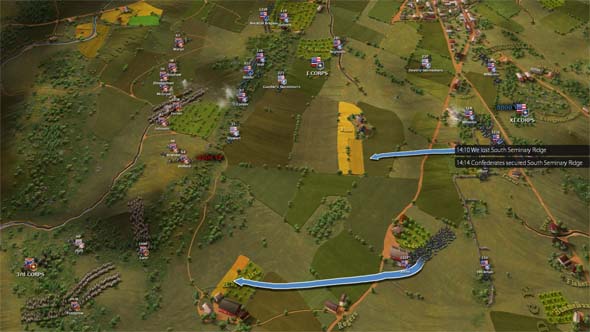
UG: Gettysburg labeled historical points of interest on the map.
When it says, "Fall back to Seminary Ridge", you know exactly where that place is.
Oddly enough, UG: Civil War isn't a strict upgrade from UG: Gettysburg. There's a few features from UG: Gettysburg that have strangely been removed. The original Gettysburg game had some very pretty battlefield artwork that displayed the names of the various locations on the map. Hills, ridges, forests, and even some individual buildings and roads were all labeled with their real-life names! McPherson's Ranch, Culp Hill, Cemetery Ridge, and more are all here. It was an excellent way of providing a sense of place to the player, as well as some historic context. Sadly that feature has been removed from the full Civil War game. I wonder if the developer just didn't have the time or resources to research that level of detail for every battle included. Or maybe it's just because the smaller skirmish sites of battles like Bull Run, Shiloh, and Antietam aren't as infamous as the sites in Gettysburg? Or maybe there were licensing issues with some of the sites, and they decided that if they couldn't include some names, then they'd rather just not include any?

The maps of UG: Gettysburg also had a stylized, polished look to them, the movement arrows were bigger and stood out more (and they stayed on screen to remind you of where the units were headed, and to give the game a textbook-like appearance), elevation and line-of-sight were a bit easier to determine, and so on. This isn't to say that UG: Civil War is a particularly ugly game to look at. If you can get past the simplistic unit sprites, then the game still looks fine. It's just that UG: Gettyburg looked noticeably better!
A House Divided Against Itself...
The campaign of Ultimate General: Civil War will take the player through most of the major battles of the American Civil War. Not just Gettysburg. It also includes some optional smaller skirmishes and situations. In between battles, you'll be tasked with spending money and character prestige to replenish your troops, recruit new and larger regiments, equip your troops with better weapons, and assigning officers to command your corps and divisions. As you win battles, you'll be awarded experience levels that you can spend to upgrade your custom general in several different categories. Upgrading your economy skill will lower the cost of troops and provisions. Increasing your organization skill will increase the size of your army. Increasing your training skill will improve the fighting ability of your regiments. And so on... [More]
de07826a-dae3-41e8-b22b-a5b0f850dc64|0|.0
Tags:Ultimate General, Civil War, Ultimate General: Civil War, Ultimate General: Gettysburg, United States, Union, Confederate States of America, Confederacy, Shiloh, Bull Run, Manassas, Gettysburg, indie gaming, Steam, history, strategy, AI, infantry, cavalry, artillery, skirmisher
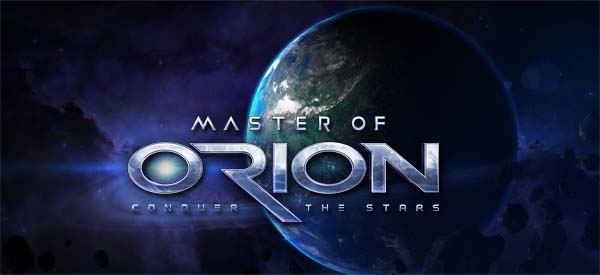
The 2016 reboot of Master of Orion kind of shoots itself in the foot a bit with its own subtitle: "Conquer the Stars". When I play 4x games, I like to feel like I'm really building an empire, managing an economy, and conducting diplomacy. All of those things are present in Master of Orion, but I've gotten a pretty distinct feeling that this is yet another strategy game that falls victim to military rushing being the optimal strategy by far. Master of Orion doesn't really want you to build a civilization and colonize the galaxy; it firmly wants you to do what its subtitle tells you: conquer the stars.
Master of Orion III was kind of shit (it was boring, ugly, and completely lacked personality and substance), but at least it made some effort to be new and interesting. Most noticeably, the galactic map was actually three-dimensional. Sure, this was a navigational and UI nightmare for the human player, but it required players to think differently about how they approached expansion and warfare. At a more fundamental level, MoO3 sought to be a game about macro-management, asking the player to manage a vast galactic empire rather than just a collection of a dozen or so planets. The meat of the game, thus, was intended to be in the mid-to-late stages, as developed empires engaged in epic battles for survival, rather than all the fun and challenge being front-loaded in the early rush to colonize all the nearby planets. It didn't work, but at least it was trying to genuinely innovate the 4x genre.
The new Master of Orion isn't anywhere near that ambitious, and seeks instead to simply bring the original Master of Orion concept (in its simplest form) into the age of high-resolution 3-d graphics. It's a scaled-down, bog-standard space-4x game that borrows heavily from Endless Space and Civilization V. But it is at least a competent one!
Conquer the Stars isn't as big, complex, or ambitious as Master of Orion 3, but at least it's competent.
The galaxy itself isn't very big this time around. Depending on the map's size, there's only a few dozen stars, and most of them only have two or three planets. Unstable star lanes and space monsters can lock you out of exploring certain systems until you research certain technologies or grow your military sufficiently large (respectively). Other than that, exploration is over fairly quickly (especially once you start performing map trades in diplomacy).
Planet-management is also fairly easy. You can assign population meeples between one of three different types of output: food, production, and research. Meeples of different jobs and races have different icons, and unhappy meeples on strike have icons that sit down holding a picket sign. It makes it very easy to see what your population's current status is at a glance. There's just not really much to do with them. You don't have to assign them to work specific buildings, and with only 3 outputs to manage, balancing or specializing isn't that difficult.
All the buildings in the game are also one-time builds that don't serve much function other than to provide flat points of one of the three outputs, or to modify the efficiency of meeples in a particular output category. Buildings that have unique functionality (such as the Spy Center, Gravity Generators, or Interplanetary Administration) are few and far between. The only other thing that you do with your planets is to occasionally terraform them in order to boost your max population and unlock additional slots along each of the output tracks.
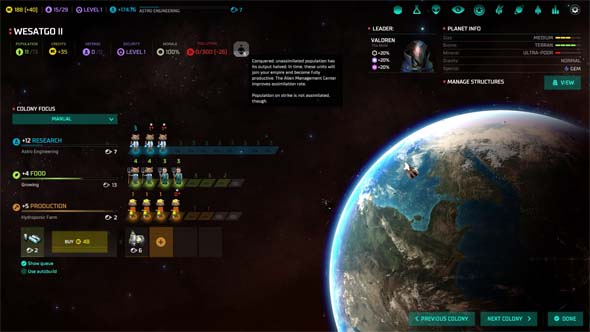
Each point of population is of a specific race, which affects the morale of conquered planets.
The tech tree also feels kind of bland and linear. I would much prefer a tech web along the lines of Civilization: Beyond Earth. Master of Orion kind of goes in this direction a bit by including some techs in which you have to chose which of two different items you want to take when you research certain techs. You can then trade for the other via diplomacy if you want to. It's kind of like the leaf nodes in Beyond Earth, but only some techs have them, and I rarely had to think too hard about which one I wanted... [More]
b529f082-d6e2-4759-8316-2633e3e77143|0|.0
Tags:Master of Orion, Master of Orion: Conquer the Stars, NGD Studios, Wargaming Labs, Steam, strategy, grand strategy, 4x, turn-based strategy, PC, science fiction, space, exploration, expansion, exploitation, extermination, colony, war, Michael Dorn, John de Lancie, Mark Hamill, Alan Tudyk, Nolan North, meeple, Master of Orion 3
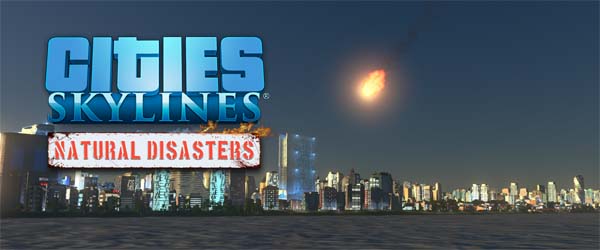
Cities: Skylines has always been a game that takes some different approaches to city builder gameplay. The base game explored how a city's geography can influence the development of the city, and also put a particular emphasis on designing efficient transit infrastructure by allowing the player incredible freedom to construct your own roads, highways, and interchanges, rather than relying on prefab ramps and over/under passes. None of these concepts were new to city builders, but Skylines added nuance to them and made them much more active elements of gameplay.
Its newest expansion DLC, Natural Disasters, follows suit. This is a very difficult expansion to review because its content - by its very nature - is random and unpredictable. Natural disasters aren't new to city builders. Disasters were a popular component of the old SimCity games, as many players enjoyed building up their beautiful metropolises only to unleash earthquakes, tornadoes, meteor impacts, and even alien invasions and dinosaur attacks and watch it all burn. Now Skylines has support for this fan-favorite SimCity feature, but it takes this commonplace feature in some new and interesting directions.
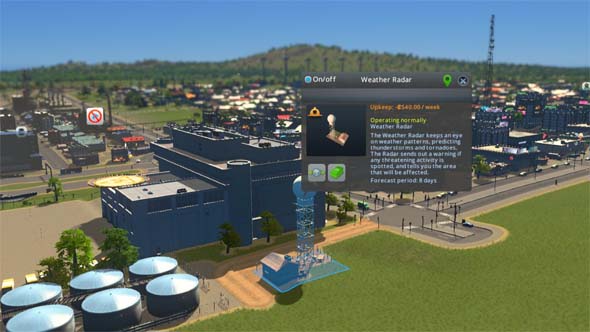
Installing early warning and detection systems will give you advance notice when a disaster is imminent.
Most notably, Cities: Skylines' take on disasters puts emphasis on preparation for disasters, rather than on the chaos of the disaster itself and the clean-up in its aftermath. Like with its SimCity forebears, disasters are something that you can toggle on or off in the game's menu, and you can also adjust their frequency. When enabled, you'll encounter disasters of various flavors ranging from forest fires to lightning strikes, to tsunami and meteor impacts. You'll have to make sure that your city is protected by preventative measures, and that it's protected against these eventualities.
Early-warning systems like firewatch towers, weather radar, and space telescopes can warn you about forest fires, storms or tornadoes, or even incoming meteors (respectively), and can mean the difference between your citizens having enough time to evacuate, or half your population being buried under rubble. You'll need evacuation shelters for you citizens to escape to, and each shelter needs to built long enough in advance for it to be stocked with supplies of food, water, and other essentials (which must be pulled from your city's economy or imported). And lastly, you'll need radio towers to warn your citizens to get to their designated shelters.
Building emergency shelters, stocking them with supplies, and planning evacuation routes will protect your citizens.
You can also create planned evacuation routes similar to bus routes that will pick up residents and take them to a shelter. I had some trouble getting these routes to work properly though. The fact that the buses are dispatched when an evacuation is activated means that they often create a log jam on your roads as they all funnel out of the shelter. I also had issues with the buses apparently not picking up people who were at more distant stops on the route, since the areas along the route that were far from the shelter never managed to evacuate. Maybe there's some trick to getting these routes to work properly that I just haven't found yet. But this does highlight one problem with the expansion: its new systems are not very well documented or explained... [More]
9ae61f59-31e1-483a-bb60-03cd1377e8b2|2|3.0
Tags:Cities: Skylines, Cities: Skylines: Natural Disasters, Colossal Order Ltd., Paradox Interactive, Steam, Steam Workshop, city simulation, DLC, expansion, disaster, natural disaster, emergency, evacuation, fire, earthquake, tornado, meteor, tsunami, flood
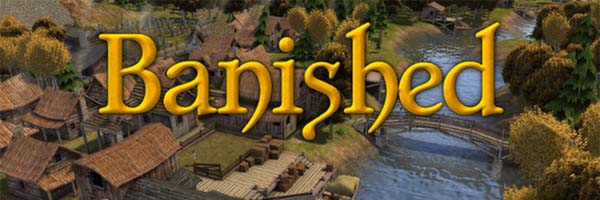
In between games of Madden 17, I need something to tide me over until the release of Civilization VI consumes my life at the end of October. As such, I did what I usually do in these situations, and I dove into my Steam backlog to look for something that's been sitting around, unplayed, for a couple years. Usually, I try to find some short games like This War of Mine or Papers, Please. I try to avoid the bigger games because they can end up consuming more of my time than I want them to, and if I jump to something else, then I may not go back to such a game to give it a fair chance. Sorry, Master of Orion, Endless Legend, and Endless Space 2, you'll all have to wait until after my upcoming Civ VI bender before I can give any of you a fair chance. That being said, I decided to take a risk and try out a city-builder that I've had sitting around for awhile. I love city-builders, and so this could easily have dragged on for weeks or months, but I hoped that the narrow scope of this game would mean that it wouldn't take as long to get my fill of it.
Banished is a game that offers unforgiving tough love. I feel like this game is the "Oregon Trail" of city-builders, and it's enjoyable as a challenging game of resource management. Unfortunately, it isn't exactly the best at explaining itself, and so it requires a lot of trial and error in order to get going. There's a lot of cycles of cascading success or failure, so you'll likely be restarting your games multiple times before you get anything remotely close to a sizable village. I would also advise that you try to keep multiple save states for your early cities so that if you make a small mistake that starts to spiral into catastrophe, you can reload and fix it without having to restart the entire game.
The tutorial explains a lot of the basic functionality of the buildings, but it never really addresses how to get the most out of these buildings. This results in an unnecessarily high learning curve and bar of entry as you try to stumble upon the optimal placements and uses of buildings. I kept making little mistakes that had big repercussions that forced me into restarting my very first game multiple times - even going so far as to save the random map seed so that I could restart in the same map and try different approaches to some things.
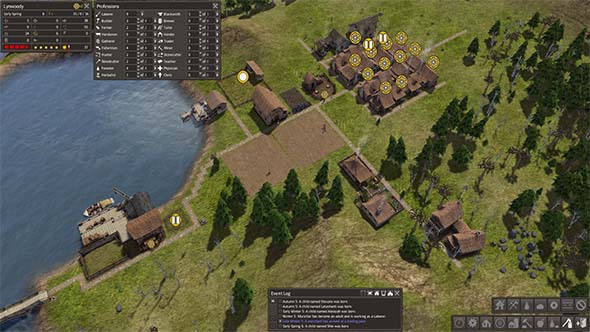
I had to iterate through some sub-optimal building placements before stumbling upon a viable city.
An example of a small misstep that crippled a game was that I built a farm that overlapped slightly with a single tree in one corner. Normally, farms are created as soon as you finish zoning them, and you simply have to select which crop to plant and assign workers to work it. But if there are any rocks or trees, then you must first remove them in order for the farm field to be built (like with any other building). So while I waited for some laborers to come chop down the trees (uncertain why nobody was bothering to cut down that one fracking tree!) spring passed and the window for planting closed. So the farm went un-used for the rest of the year, I had no crops saved up, and several adults and children died, leaving my village under-staffed for the following year. So I restarted and placed my farm entirely in an open field, planted during the first spring, and collected a healthy reserve of wheat to keep all my villagers fed through the winter... [More]
f4887e6d-007a-43fa-9a02-db5781c5c44b|1|5.0
Tags:Banished, Shining Rock Software, Steam, indie gaming, city simulation, simulation, strategy, survival, medieval, renaissance, agriculture, farming, resource management, food, minerals, roads, seasons, winter, Oregon Trail

After experiencing some annoying performance issues on the PS4 version of Dark Souls III (including a framerate capped at 30 fps), I decided that I'd hold out the extra three days for the PC version of No Man's Sky. I assumed that the keyboard and mouse controls would be more comfortable, since the game is half shooter, half flight-sim. I assumed that the PC version would perform better and look better. And I figure that the game will eventually enjoy a vibrant modding community that is likely impossible to spring up on the PS4, since (as far as I know) the PS4 does not support modding in any way. I, once again, may have been wrong in my choice of platform
In addition to having to wait three extra days for the game to release on PC, I've read a lot of reports of severe problems with the PC version of the game at launch. It simply won't run on certain machines with certain graphics cards. Many rigs have consistent performance issues. My PC is a few years old, but it more than meets the system requirements for the game, yet I've been stuck having to run it on medium graphics settings. Upping the settings to high only results in the game becoming unplayably slow whenever I step into the cockpit of my ship. I'm talking, like half a frame per second, and the game dropping all my inputs. The final insult is that the game breaks when you alt-tab out of it, which prevents you from alt-tabbing back into it. If you alt-tab out, you'll have to kill the process in task manager and restart the app - which, of course, will cause a loss of any progress since the last autosave. So despite having a dual-monitor set-up, I can't alt-tab out to open up podcasts or play some tunes while I warp around the galaxy.
Most of these problems will likely get fixed at some point (and some of them already have), and hopefully I'll be able to run the game at high graphics settings. But in the meantime, if you're interested in playing the game, then the PS4 version is probably the technically superior one right now. Apparently, the PS4 version also has numerous performance issues, including crashes.
Sadly, technical problems are only the beginning of my complaints with this game.
Betraying the naturalist within
Instead of being a game about exploring strange new worlds and discovering exotic wildlife and natural wonders of the universe (as I'd hoped), No Man's Sky turns out to be quite the opposite: a game about conspicuous consumption. The core game loop does not consist of landing on an alien world to explore and catalog the local flora and fauna. Instead, you land your ship in a vibrantly-colored patch of minerals and plants, and you begin strip-mining the site clean. You harvest the raw materials that you'll use to refuel your space ship so that you can warp to the next planet to strip its resources for more fuel.
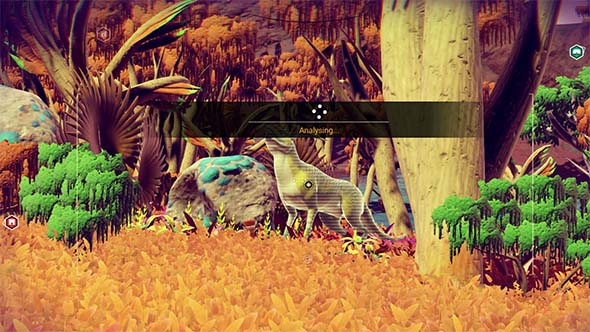
The incentives to catalog alien life feel extrinsicly-imposed and not a natural part of the core game experience.
Actually seeking out and cataloging the local wildlife takes a backseat - if you even bother to do it at all. The game isn't about that. There's nothing in the core gameplay loop or narrative that actually sets the game up to be about cataloging alien life. The only reason that the player has to even bother with scanning and analyzing is because you're rewarded with in-game currency for scanning stuff, even though there's no in-game reason (that I could discern) for why you would be getting paid to catalog alien life or who it is that's putting the money in your account. It all feels so thoroughly divorced from the rest of the game, and the money feels like an extrinsic incentive that is imposed from outside the scope of actual gameplay. In fact, I don't know why the game would have an in-game reason for why you would get paid to catalog stuff. After all, these planets are all already known by somebody in the game universe - they have space stations in every star systems and colony modules and trading posts on every planet long before you ever get there to "discover" them. So not only does cataloging life feel like an extrinsically-imposed mechanic, even this process of "discovering" feels completely fake and artificial... [More]
014d7ec0-67ee-4a6d-aaf4-03269c447640|5|3.8
Tags:No Man's Sky, Hello Games, Sony, PlayStation 4, PS4, Steam, PC, procedurally generated, science, dinosaur, animal, evolution, geology, astronomy, cosmology, science fiction, exploration, discovery, harvest, crafting, space, warp drive, Skinner Box, casual gaming, mobile gaming, Spore
|

| 12 | | | | | | | 60 | | 11 | | | | | | | 55 | | 10 | | | | | | | 50 | | 09 | | | | | | | 45 | | 08 | | | | | | | 40 | | 07 | | | | | | | 35 | | 06 | | | | | | | 30 | | 05 | | | | | | | 25 | | 04 | | | | | | | 20 | | 03 | | | | | | | 15 | | 02 | | | | | | | 10 | | 01 | | | | | | | 05 |
|